#Historic Judgement on Interest
Text
IEP Forum on FSC Verdict on Riba - Experts View - Mufti Dr. Zubair Naseem
IEP Forum on FSC Verdict on Riba – Experts View – Mufti Dr. Zubair Naseem
IEP Forum on FSC Verdict on Riba – Experts View
Mufti Dr. Zubair Ahmed Bin Naseem Ahmed
Shari’ah Scholar & Islamic Banking Expert
PhD, National University of Malaysia
Recently, Federal Shari’ah Court of Pakistan has given its judgement on the Riba case. The verdict reaffirmed the historic judgement on interest first given in 1991. But, the subsequent appeals process reopened the case.…

View On WordPress
#Bank Interest and Riba#Federal Shariat Court#Historic Judgement on Interest#Interest Free Banking#Interest Free Economy#Is Islamic Banking Really Islamic#Islamic Banking#Islamic Economics Project#Islamic Finance#Mufti Taqi Usmani#Mufti Zubair Naseem#Pakistan Economy#Riba#Riba Case in Federal Shariah Court#Riba Free Banking#Usury
0 notes
Text
What a long historically interesting life this woman had.
And I dont mean this in: wow, monarchy great - I dont care, literally couldn't give 5 shits.
But as someone interested in history... yeah, was an interesting life.
#im not british or commonewealth#i dont get to pick the monarchy or care about it much#i just really care about the historical conext everything happened in#the things she has seen and went through#its just interesting thats all#long life too#and when you are very uh dry about it#you have to agree that she did what she promised she would at 21#which is keep the british empire together#for better and worse#but either way thats not my judgement to make i dont care#i mean i do care a little about empire cruelty and whatever what i mean is thats not what im talking about rn
2 notes
·
View notes
Note
Hi!
Can you elaborate on "Fuck GRRM's committment to 'historical realism' without knowing anything about medieval social history"? I would love to know about what GRRM gets wrong about medieval gender roles, specifically.
So Cersei learns at an early age that she has no agency, her only value is producing heirs and is barred from traditional routes of power so she has to use underhanded methods such as influencing men with sex or using underhanded magical means. I would love an explanation on why this doesn't reflect medieval queen consorts and noble women irl.
Sure! The basic summary is: GRRM "knows" the things that everyone "knows" about the middle ages, which are broad stereotypes often reflective of a) primary sources that deserve a critical reading rather than being taken at face value and b) the judgements of later periods making themselves look better at the medieval period's expense.
As Shiloh Carroll argues, building on the work of Helen Young, “readers are caught in a ‘feedback loop’ in which Martin’s work helps to create a neomedieval idea of the Middle Ages, which then becomes their idea of what the Middle Ages ‘really’ looked like, which is then used to defend Martin’s work as ‘realistic’ because it matches their idea of the real Middle Ages.”
Since you're mainly interested in Cersei here, I'd strongly recommend a book: Queenship and the Women of Westeros: Female Agency and Advice in Game of Thrones and A Song of Ice and Fire, edited by Zita Eva Rohr and Lisa Benz. It's an excellent read and speaks to exactly what you're asking about. The tone of the book is very positive and non-judgemental when it comes to GRRM and his depictions of women on the whole, but I think some of this is rhetorical positioning to not seem like "mean angry academics jumping on fiction for not being accurate," as the actual content turns the reader to thinking about how much agency and power medieval queens had in different European societies and how little of that worked its way into GRRM's worldbuilding.
It's true that women typically didn't inherit titles and thrones in their own right, and that they were usually given in marriage for political/dynastic reasons. However, they weren't seen as brood mares whose only duty was to pop out sons: both queens and noblewomen had roles to play as household managers, counselors, and lieutenants, actively participating in the ruling of their domains and in local and international diplomacy (women in political alliances were not just pawns sent to a powerful man's bed, but were to act as ambassadors for their families and to pass information back and forth), and they had to be raised with an understanding of this so that they could learn to do it. Motherhood was very important, don't get me wrong, but it's a mistake to assume as pop culture does that a wife's foremost duty being to provide heirs for her family meant that she was ONLY seen as a mother/potential mother.
Catelyn is a great example of what was expected of women in these positions. But in the books, Catelyn is basically the only woman who inhabits this role, and the impression given is that she's exceptional, that she's just in charge of the household because she's so great at it that Ned allows her to be his partner, and that he listens to her advice because she happens to be a wise person in his orbit - and also that Ned is exceptional for giving so much power to a woman, because in the world of ASOIAF, it takes an especially good man to do this. In GRRM's view of the medieval world, realpolitik and the accumulation of power are the most important things, so men in Westeros are extremely unlikely to give up any authority to their wives, even though this is historically inaccurate.
Cersei, on the other hand, is supposed to be a more realistic depiction of what would happen to an ambitious medieval woman. There's a chapter titled "Queen of Sad Mischance: Medievalism, “Realism,” and the Case of Cersei Lannister" in the book I've rec'd, and it deals with why this is problematic extremely well. (This is the source of the quote at the top of this post.) In it, Kavita Mudan Finn argues that Cersei embodies pretty much every medieval trope for the illegitimate wielding of power by a woman. She underhandedly gets people killed for opposing her, she seduces men into doing her bidding, she advances her family's interests and her own at the expense of the realm. She's made sympathetic through fannish interpretation and Lena Headey's performance, but in the text she's an evil woman doing evil things. Even when she gets to be regent for her son - a completely legitimate historical position that allowed women to handle the levers of power almost exactly like a king - she continues to do shitty things and not be taken seriously because she's just not good at ruling.
But even before then, from a medieval perspective she had access to completely legitimate power that she didn't use: she'd have had estates giving her a large personal income, religious establishments to patronize (giving her a good reputation as a pious woman and people she'd put in high positions being personally loyal to her), artists and writers to patronize as well, power over her household, men around her listening to her counsel. That she doesn't have that is a reflection of GRRM either deciding these things don't really exist in Westeros in order to make it a worse world than medieval Europe and justify Cersei feeling she had to use underhanded means of power, or not knowing that they were ordinary and unexceptional because he has a good working knowledge of the politics of the Wars of the Roses but little to no knowledge of social history beyond pop culture osmosis, and, imo, little to no interest in actual power dynamics.
There are a lot of books I'd recommend on this subject. There's a series from Palgrave Macmillan called "Queenship and Power" and nearly all the books in it are THE BEST. Theresa Earenfight's Queenship in Medieval Europe is a very readable introduction to the situations of queens in European societies across the continent. She also has a book, Women and Wealth in Late Medieval Europe, that also addresses non-royal women's power. I'm also a huge fan of English Aristocratic Women, 1450-1550: Marriage and Family, Property and Careers, by Barbara Harris, which really emphasizes the "career" aspect of women's lives as administrators and diplomats.
245 notes
·
View notes
Text
By Its Cover: Prologue




By Its Cover: Prologue
Pairing: Jake "Hangman" Seresin x Reader
Summary: The frivolity of high society has never much interested in you. You preferred to spend your time reading, something your sisters couldn't fathom as they spent their time shopping the latest dress styles. The youngest of five children and the fourth daughter, not much was expected of you. You knew you might be married one day, but you hoped beyond hope that it would be to someone that might understand your intellectual pursuits. You begin exchanging letters with a mysterious stranger, and what's more, your older brother's rakish best friend seems to find himself in your path more and more as the season goes on. What's a girl to do? (Regency!AU)
Content Warning: Historical inaccuracies, Regency period, Period related drama, Talks of judgement, Period typical sexism, Talks of marriage, Death of a parent, Talks of making a debut, Reader's feelings are hurt, light angst, some fluff. I think that's it, but let me know if I missed something!
Word Count: 1.6k
Series Masterlist || Moodboard

Winter gave way to spring as quickly as one rumor gave way to another. Public opinion changed as quickly as the seasons, as far as you were concerned. Your whole life was spent in the thralls of high society, your entire life scrutinized by the judgmental lords and ladies of the Island before you could even walk or talk.
You had earned your reputation as a rather odd girl fairly young not quite seven years. Where the other girls were interested in dolls and hair ribbons, you found yourself enraptured by the world around you. On more than one occasion, you received a tongue lashing from your nanny as you tracked mud through the house after one of your many excursions into the garden, your mother heaving a tired sigh as you argued the merits of fresh air and stimulating your endless supply of curiosity.
“My darling,” she’d say pointedly, giving you one of her signature looks that reeked of motherly disapproval and exasperation, “while I find the fresh air and time in the garden as stimulating as the next person, it is unbecoming of a lady, dearest.”
You had recounted the tale to your father later that evening, the older man sitting at his desk with his feet propped up on the top of the wooden surface as he thumbed through a page of one of his many novels.
“I just don’t understand, Papa,” you muttered, your hair hanging from where you sat upside down on the chaise. “Why can Will go about doing as he pleases while I am to be tied down by all of these ridiculous rules?”
Your father had merely chuckled, marking his page before setting his book down to look at you.
“My darling Bug,” he smiled, taking his feet down and opening his arms wide to you. “Come here.”
You obeyed, righting yourself on the couch before standing to walk over to him. Bug had been bestowed upon you as your moniker well before you could remember. Your father had said that you earned the nickname once you were old enough to crawl all over the place, getting into things that you most decidedly shouldn’t. Your siblings had said it was because you were a pest.
Your father grasped your upper arms gently, the smile on his face as affectionate as always.
“William doesn’t get to do as he pleases,” he explained, tucking a strand of hair behind your ear as you pouted at him. “He will one day be lord earl of this estate, and as such he will take on many duties that will prevent him from doing a great deal of things. Indeed, he will take on many things that will see him as constrained as you.”
“I don’t believe you,” you grumbled, scowling up at him. Your father tilted his head back with a booming laugh, patting your head before placing a gentle kiss to your forehead.
“Nevermind all of that now, my little Lady Bug,” he hummed. “I’ve found a new story for you, would you like to read it?”
Your father was a fixture in your life, encouraging your love of learning perhaps more than he should have given the expectations set forth by society for you. Your mother saw no problem with your need for intellectual pursuits, but often grew exasperated at your clear lack of regard for decorum and stereotypical ladylike hobbies. Your elder sisters were the pinnacle of what proper ladies should look like in society, and you often found yourself being compared to them, much to your chagrin.
North Island, or the Island for short, was the nickname given to the group of nobles and upperclass that made up the elite, wealthy families that dictated the standards of polite society - the society you had the misfortune of being born into along with your elder siblings.
Your brother, William, was the pride of your family. He was a handsome, strong man that commanded the room with his very presence. He was jovial, charismatic, and intelligent by all accounts, and very popular amongst the other ladies of the Island.
Lydia was the second eldest after William, and was the the spitting image of your mother, with beautiful features that left all the men on the Island giving her longing looks. It was the Earl Reuben Fitch that won her hand in the end only seven seasons ago, and now they visited once in a while with their three children in tow.
Theodosia, or Theo for short, was the second eldest daughter, having entered into society only one year after Lydia, she was the prize to be won with her charming and elegant demeanor. Not quite as beautiful as Lydia, she made up for it with her wit, having won the affection of a viscount that same year.
Georgiana, or Georgie as your family was prone to call her, was only a year older than you and had made her debut the year prior. She had not settled for any of the men of the Island the year prior, setting her sights high and determining that the best had yet to come.
You rounded out the lot as the youngest, the strange, little sister that no one knew what to do with more often than not. The ladies of the Island often remarked that your head was too full of ideals, unsuitable for a lady of your noble family, and they lamented how your mother and father must have grown lax in their child rearing when it came to you. Or perhaps you were a hopeless cause. The reason varied day to day it seemed.
You were quite content with how your life was playing out. You had your books, the garden, and your dearest friend, Natasha Trace. Natasha, or Nat, was about a year older than yourself, having made her debut the same year as Georgiana.
“I’ll be happy once you make your debut,” she had said to you one night. “I won’t feel so alone at all the balls then.”
You had frowned at her words, the very thought of entering society growing less and less appealing by the day.
“Why must I debut?” You had asked your mother not too long after. “I’m the fourth daughter of an earl. Surely it is not that important that I marry.”
“Dearest,” your mother had sighed, setting her needlework down to look at you, “marriage is not all work. As the fourth daughter, you have more freedom to marry whom you would like. Your father would have wanted you to marry.”
“Father would have wanted me to do what made me happy,” you had muttered, turning to leave the room before she could respond.
Your father had passed years prior when you were only eight, and his memory still haunted the halls of the manner. William had taken up his title as earl, seeing to the estate with the help of your mother until he was capable of doing things on his own. Ten years your senior, he had done his best to fill in the holes your father’s absence had left behind, though he still needed reminding that he was, in fact, not your father.
“You’ll be making your debut this year,” he reminded you, scribbling away in the family ledger, casting you a spare glance as you scowled down at him.
“Please don’t make that face,” he sighed, setting his quill down to give you his undivided attention. “And please don’t make this more difficult than need be. Every young lady makes her debut at some point or another.”
“Why must I debut?” You frowned, your lips quickly forming into a smirk as a thought struck you. “Can I not live out my days on my own with you to support me?”
“You may not,” Williams replied flatly. “Bug, I know it can be nerve wrecking-”
“You have no idea what it’s like,” you interjected.
“But, it’s a part of growing up. You’ll find a husband who will make you reasonably happy and live out your days with him,” he finished. You scoffed, rolling your eyes as you clasped your hands together.
“William,” you began, “who would want me? The whole Island has deemed me strange, the black sheep of our family. You would really put me through this embarrassment for the sake of tradition?”
“I think you’ll find yourself surprised at who may want you,” William countered. “Many men on the Island are in need of a wife, and some may be willing to settle for someone of your nature given the right circumstances.”
A beat passed between you two, your heart stalling in your chest at his words.
“Settle?” You laughed quietly, but there was no humor to be found in your tone. “I am something to be settled for then?”
You hated how small you sounded in that moment. Of course, you didn’t care for what others thought of you. No, you were above all of that. Still, the thought that your brother saw you as some secondhand prize, something no one would seek out, hurt, and you willed the stinging tears behind your eyes to go away as you schooled your features.
William cursed under his breath, moving to stand, his face apologetic as he rounded the desk.
“Bug, that’s not what I meant-”
“No,” you snapped, sniffly slightly as you fought to compose yourself. “You’ve said quite enough already, brother. You’ve made perfectly clear where I stand as it is.”
He moved to say something, but you waved him off, already turning to leave the study.
“You’re busy,” you said flatly, “I’ll leave you to your business.”
William called out your name, but you ignored him, walking briskly down the hall and to the solace of your family’s library.
If you were something to be settled for, then you would at least make the most of what little freedom you had left.

A/N: Ahhhh!! The long awaited, much requested Regency!AU is finally here! Here's our first taste of Bug and Jake, so what do we think? As always, comments and reblogs are greatly appreciated. If you would like to receive updates on when I post, please go follow my sideblog (@sailoraviator-library) and turn on post notifications! My work is cross posted on AO3 under the username sailor_aviator. Until next time!
#by its cover#bic#regency!au#jake hangman seresin#jake hangman seresin x reader#jake hangman seresin x you#jake hangman seresin fanfiction#jake seresin#jake seresin x reader#jake seresin x you#jake seresin fanfiction#hangman#hangman x reader#hangman x you#hangman fanfiction#top gun hangman#hangman top gun
219 notes
·
View notes
Note
wait how bougie was Tom Riddle Sr.? How nice would his Manor have been? Was he like an actually Lord with a title and stuff?
thank you very much for the ask, anon!
in half-blood prince, dumbledore refers to tom riddle sr. as "the squire's son" - which allows us to state with certainty that he was a minor aristocrat.
however, the word minor is important here.
there are - historically - two levels of aristocracy in britain. the first are the peers of the realm - which refers to families which hold one or more of the titles of duke, marquess, earl, or viscount. these are the elite of the elite - these gradations of nobility were created in the middle ages as a way of distinguishing those who held the titles from other noblemen, usually because of a close relationship [often one of blood or marriage or both] to the king.
the titles are hereditary by male primogeniture, and the holders - while this is no longer the case - used to have political power [such as the right to sit in the house of lords], simply by virtue of their birth.
[this is why they're called "peers" - it refers to them historically being close in status to royalty, and therefore expected to serve as royal advisors.]
there is another class of peer - a baronet - whose title is similarly hereditary, but whose position doesn't come historically with the right to sit in the lords or advise the king by virtue of birth. [baronets may - of course - have been members of parliament, or royal advisors selected at the king's discretion, but this would be separate from their title. a duke, in contrast, could historically expect to request a meeting with the king simply because he was a duke.]
while some families have historically been ennobled at the king's discretion, access to any of these titles is pretty much restricted to the small group of families who've held them for centuries.
but below the peers of the realm, there is a second, more minor class of aristocracy, the landed gentry - of which a village squire is a textbook example.
historically, what is meant by "landed" is an ability to live off of the rental income of one's country holdings, which would be leased to tenant farmers. that is, they are landlords in the original sense of the term - lords of the land. this is what tom sr. tells us his family does in half-blood prince:
“It’s not ours,” said a young man’s voice. “Everything on the other side of the valley belongs to us, but that cottage belongs to an old tramp called Gaunt, and his children. The son’s quite mad, you should hear some of the stories they tell in the village - ”
what is also meant by "landed" is that the family in question is of the upper-classes, but that they are still "commoners" - which in this context doesn't imply a value judgement, but which is a socio-legal term which simply indicates that they don't hold an aristocratic title such as duke, earl etc.
[and gentry families certainly aren't common in terms of financial standing... the most famous member of this class in literature? fitzwilliam darcy, whose ten thousand a year is something like thirteen million quid in today's money...]
gentry families might be very old - they might have received their lands from the king in the middle ages as a reward for knightly service, and it's interesting to imagine generations of gaunts and riddles brought up alongside each other in little hangleton - or they might be comparatively newer - tom sr.'s great-grandfather [feasibly born c.1810] could have been a self-made victorian industrialist who bought the lands from the original holder and established himself as gentry.
by 1900, it was becoming much harder for the gentry to live on rental income alone, and many would also have had jobs. these would have been elite, and very frequently were in politics, the civil service, the military, or the law. tom sr's father - whom the films call thomas, so let's go with that - might, for example, have served as a high-ranking officer in the army [including during the first world war], be the local magistrate, or be the local member of parliament.
in terms of titles, thomas riddle would almost undoubtedly be sir thomas - and this is how it would be correct to address him. but this title would be a courtesy, and it wouldn't be hereditary unless the riddles were also baronets [which it's entirely plausible that they were].
which is to say, tom sr. would not have a title while his father was alive - although he would have the right to be referred to formally in writing as mr thomas riddle esq. [esquire]. the correct form of verbal address for anyone other than friends and family would be to call him mr riddle, although the riddles' servants would probably refer to him as mister tom.
tom jr. would not have a title while his father or grandfather was alive. if the riddles were baronets, he would technically inherit the title after he kills the rest of the male line... but given that tom sr. never acknowledged him and his existence was presumably unknown to the riddles' lawyers this wouldn't be something which happened in reality. the estate's executors clearly took control of the riddles' property, the land was portioned off and sold, and the house became a standalone property for sale.
the riddle house - which is a name used informally for it in little hangleton, it would have a different "proper" name - is described in canon in ways which show that it's a typical manor house, which means it would look something like this:


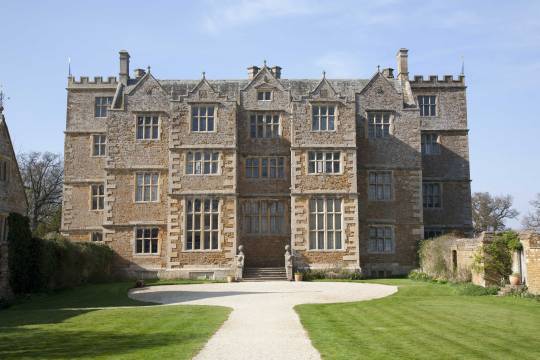


these houses are obviously very impressive, but they're tiny in size in comparison to the magnificent stately homes - places like blenheim palace, chatsworth, burghley house, holkham hall - lived in by the titled aristocracy. the riddles would entertain - for example - by giving house parties, dinner parties, hunting parties, etc., but they wouldn't have a ballroom or a dining hall capable of seating hundreds.
[they would probably also own a property - probably a flat or small house - in london.]
they would have servants, but not colossal numbers - they would undoubtedly have a butler but not footmen, and the upstairs maids would report to the butler since they probably wouldn't have a housekeeper. they canonically have a cook, who probably had one or two kitchen maids assisting, and they canonically have a gardener - frank bryce - who probably doesn't have any assistants. they may, depending on the size of the estate, have a gamekeeper. sir thomas undoubtedly had a secretary and a chauffeur, and his wife might have a lady's maid. tom sr. would have had a nanny and then been educated until at least the age of eight by a governess, but would then have attended a prep school [either day or boarding] until the age of thirteen, and then gone to a boarding school, from which he likely went on [on the basis of social class rather than talent] to oxford or cambridge.
the family would have enormous social influence locally. most people - and also businesses - in little hangleton would be their tenants, and they would also probably have a say over the appointment of the local clergyman [an important figure in the community in the nineteenth and early twentieth centuries], since the parish church is likely to have been something called a "living" - the thing which turns up again and again in jane austen - which means that the church and its parsonage technically belongs to the landowner, but is granted to the vicar as a freehold while he's in post.
gossip about the riddles' doings would also be the main source of local interest - the servants were dining out for months on tom sr.'s elopement and return.
so they're something resembling celebrities - but they're local celebrities. nobody in london - and even nobody in cities we can imagine are nearer to little hangleton, such as liverpool - would particularly know or care who they were. tom sr. might have made it into the london gossip columns if he was part of a particularly scandalous "set" [a group of friends] who socialised in the capital, but these mentions would have been fleeting - and the press would have been much more concerned by the doings of members of his set who were genuinely titled or who were legitimately famous.
[this is the reason why mrs cole doesn't recognise the name. if merope had said her son was to be named cecil beaton after his father, she may well have been prompted to hunt him down...]
so tom sr. is elite - but he's elite in a way which is extremely culturally-specific, and which is [just like the portrayal of aristocracy in the wizarding world - the blacks, for example, are far less aristocratic than the riddles in terms of canonical vibe] often exaggerated into the sort of pseudo-royal grand aristocracy which the british period-drama-industrial-complex makes such a big deal of.
and tom jr.'s character is affected by this in a series of extremely interesting ways.
by which i mean that, in terms of blood, he's probably the most aristocratic character in the series - the absence of grand aristocracy in the wizarding world would mean that [were he raised by his father] he would come from a social background which was equivalent [even as it was divided from them by virtue of being muggle] to any of his fellow slytherins, and would help him easily blend into their society because the manners, genre of socio-cultural reference points [he would recognise, for example, that quidditch heavily resembles both rugby and polo], accent and way of speaking etc. that he would possess would be broadly indistinguishable from those of his pureblood peers.
[this is why justin finch-fletchley and draco malfoy speak in essentially the same way.]
but he would then be given the enormous boost in cachet - one which would genuinely elevate him above the rest of his cohort - of his maternal line.
and we see in canon that this does bestow some privilege on him among his peers while he's in school:
Tom Riddle merely smiled as the others laughed again. Harry noticed that he was by no means the eldest of the group of boys, but that they all seemed to look to him as their leader.
“I don’t know that politics would suit me, sir,” he said when the laughter had died away. “I don’t have the right kind of background, for one thing.”
A couple of the boys around him smirked at each other. Harry was sure they were enjoying a private joke, undoubtedly about what they knew, or suspected, regarding their gang leader’s famous ancestor.
where he's let down socially is that people like slughorn - to whom he can't reveal his slytherin ancestry and hope to maintain cover for his wrongdoing - don't think he's come from anywhere particularly special. this is because he has a muggle father - absolutely - but it's even more that he has a muggle father who, since he left him to be raised in an orphanage, was presumably working-class.
what the young voldemort lacks is any socio-cultural familiarity with the muggle class performance which the class performance of the wizarding world parallels. abraxas malfoy boasting about how important his father is would be something a tom jr. raised by the riddles could match - "oh yes, my father gives to all sorts of causes too. in fact, he was invited to buckingham palace because of it." - establishing himself as an equal in terms of class and social influence even if he isn't an equal in blood.
what actually happens in canon is that the orphaned tom - with his uncouth manners and his working-class accent - has no hope of gaining any sort of social equality with his posh peers.
so he becomes determined to outrank - and humiliate and control - them.
#asks answered#asenora meta#tom riddle sr#tom riddle#lord voldemort#surprise! it's the class system!
190 notes
·
View notes
Text
i think there's an interesting connective thread between sarah snook saying she thinks shiv just reads whatever's currently popular and got people talking ("everyone's reading this? all right, fine."), and alan ruck saying he thinks connor only reads books that are very old and considered classics - that way he doesn't have to decide if it has literary merit, because everyone else has already decided it's a seminal work. like, it takes them in the opposite direction when looking for materials, but in both cases they're being driven by a desire to not have to have original artistic tastes or opinions and just defer to someone else's judgements. which is just so telling?
shiv can be a bit of a black sheep politically, but she arrived there by just trying to define herself in opposition to her family; it's an indirect way of having someone else decide for you to keep trying to do the opposite of what's expected. it requires little in the way of genuine beliefs, which is why she flips very easily when it's convenient. connor meanwhile just wants any scrap of attention he can get, which is why he brings up random trivia or collects bizarre historical items. he likes to be able to just say or have something that gets people's attention, without having to provide any real explanation or show understanding. and i think it's interesting how that carries over into things like entertainment or art - the lack of self conception makes it hard to do things like pick up a random book you've never heard of because it looks interesting.
#succession#connor roy#shiv roy#roman meanwhile has never read a book. his reign of terror in la i think had more to do w him being difficult#than him having genuine artistic opinions about kids movies#though i'd love to know more about that era of his life#kendall i think is similar to shiv but with more of a pop culture movies/tv slant#and i think he is probably hipstery in some ways and tries to act above the mainstream#but he's just getting his recs by going off of who everyone says is an auteur#he is also incapable of just like sitting and having a reaction to a work of art#kaitlin speaks
270 notes
·
View notes
Text
makes you wonder — sam winchester
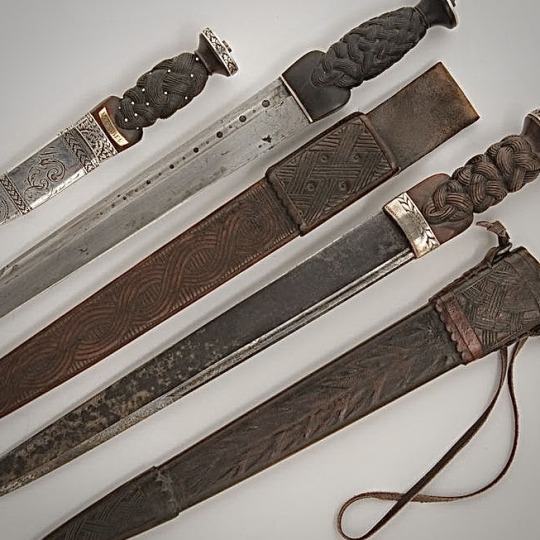


pairing : sam winchester x gn!awkward!reader ➖⟢ genre : fluff ➖⟢ cw : uses y/n, some of the lore/history is totally made up, swearing, workplace bullying/verbal harassment (i’m so sorry if your name is mark, he’s the asshole character), likely contains a few mistakes, mentions of canon typical violence and monsters ➖⟢ wc : 5.2K
summary : you're the local expert on ancient weaponry, and fake fbi agent sam needs your help finding a certain dagger for a case.
pronunciation guide (using scottish gaelic) : each-uishge — yahk-oosh-ga (hk is pronounced in the back of the throat like loch). biodag — bidag (the g is almost a k sound) [ disclaimer, i found these pronunciations off of the internet! i’m not scottish nor do i speak scottish gaelic, so if anyone can correct anything i got wrong, i’d be super grateful for it! ]

certainly including the fact that it’s exactly what you want to be doing, working as a curator at your city’s history museum is near total perfection for you. not without much hard work and research, you were able to get a job that focuses on your specialty. historic weaponry. plus, your extra knowledge and fascination with mythologies and folklore gave you the perfect edge (pun intended) during interviews.
as a plus, you’re also able to spend minimal time interacting with people, even less so with those who don’t share the common interest of at least museum curation. of course, even that can’t magic away your awkwardness, and you still dread team meetings, but none of your coworkers save the resident asshole care at all when you stumble over your words or speak in clunky sentences. you’re smart, kind, and good at your job, so everyone except mark lessinger is more than happy to have you around. mark, the aforementioned resident asshole, is only around still because he’s the single person for miles who cares about the bland history of the town that is “strongly encouraged” by the local government to be kept in the museum. you’re sure he doesn’t do anything other than watch tv shows at his desk, lounge in the museum café. and make snide comments about anybody he can, because that exhibit hasn’t been updated in years and likely never will be unless something spectacular happens.
when you hear the click of the office door opening, you glance up from the work on your desk on instinct. it’s no surprise to see the devil himself (a mean and entirely pathetic thirty-four year old white man) walk through the door. mark was probably off slacking in the café like he does whenever he can get away with it, which is often considering he has nothing helpful to offer anyway.
it’s the man who follows him that snags at your gaze and keeps your eyes lingering on the doorway for a second longer than usual. in the split second that you take his appearance in, you’re surprised by how much you want to keep looking at him, rather than the diagram of a seventeenth century revolver you’re hoping to include in the exhibit you’re planning for next fall. the gun is fascinating to you, moreso than just about anyone who could walk in that door. but something about this man is beautiful, so much so that you don’t want to look away. then both mark’s and his eyes fall on you, and you snap your chin back down to refocus on your work. this, of course, doesn’t work, because you can still feel them looking at you.
“that’s them right there. you know, weapons are the only thing that they’re useful for,” mark begins to ramble, and now you know without a doubt that they’re headed towards you, “which, unfortunately, isn't very helpful at all most of the time. but maybe they can do you some good, agent.”
that word is what catches your attention; you don’t even blink at the condescending tone to his voice or the fact that he doesn’t make any sort of attempt to hide his criticisms from you or this agent. you don’t even look up until the two men are right at your desk, so you miss the judgemental look that the stranger gives to mark’s unsavory comments about you. the idiot obviously misses the look too, because he’s smiling down at you all smug and patronizing when you give him your attention.
“this is agent giles from the fbi. the federal bureau of investigation,” he begins, cocking his head in a way that makes him look like he’s got a knot in his neck, rather than intelligent and important as you figure he intends. you just nod as the agent flashes his badge, resisting the urge to examine the tall man like one of your exhibit pieces. “well, he’s looking for a certain type of knife–” mark says slowly, like you don’t understand what he’s implying. you, on the other hand, couldn’t care less about him as you look the agent up and down, trying to look casual. you’re usually far more into ancient weaponry than men, but he is straight up gorgeous, you conclude.
“–so, you should help him look for it. it’s very important, so don’t make us look like fools by saying something weird.” you grimace internally, but don’t show much of a reaction because all you can really think about is how much of an idiot he is. and how agent giles is too pretty to be an employee of the federal government. that part is far more important than mark’s rudeness, as you’re fully aware that he has nothing of value to offer, while you absolutely do.
“i’m sure y/n will be very helpful,” says agent giles firmly, and for a moment it surprises you that he knows your name before you realize mark must have given it earlier, “thanks for the sandwich recommendation mr.” he clears his throat because he’s clearly forgotten mark’s last name, “linser.” you stifle a laugh at both the insult of this agent remembering your name, but not mark’s, and the image of mark recommending an fbi agent his favorite sandwich from the museum café.
“lessinger,” he corrects with a stupid, haughty smile that suggests he has no idea that the agent thinks he’s a dumbass and couldn’t care less about him. he doesn’t even get the memo that he’s supposed to leave until agent giles clears his throat again and gives him a pointed look. “well, if y/n can’t get you what you need, i’m sure i can figure it out, so just let me know if you need anything else,” he lands a final insult before scurrying away to his own desk.
“it’s very bad,” you say with a matter of fact tone and shake of your head, once he’s finally out of ear shot.
the agent raises his eyebrows in question, like he’s not one hundred percent sure what you’re referring to. “him?” he scoffs, “yeah, he’s a total asshole.” agent gile’s tone is much lighter and pleasant when he’s talking just to you, though he certainly means what he’s just said.
“oh, well, no. i mean, yes, he is a complete asshole, but i meant to say that– um, well, the sandwich. it’s very bad,” you repeat the sentiment in earnest after realizing you started speaking almost completely out of context. now you feel the need to explain, “he always gets the same sandwich, and it’s not a good one. if you’re hungry you should get the superfood salad. very healthy, and really good– or, i mean, if you wanted a sandwich, the blt is quite good, especially if you add avocado,” you trail off and realize you’re completely off topic, “but, uh– that’s not what you’re here for, obviously. i’m sorry, i don’t mean to waste your time, agent. uh, how can i help you?”
“no, no, that’s okay,” he says, his pretty hazel eyes full of sincerity, “i am in fact hungry, but i’d never take his recommendation, so i’m glad to have yours. i love salad,” he smiles.
“oh, thanks,” you relax, before wondering if that’s a normal response. but, instead of trying to correct yourself like you normally might, you stay silent to avoid going off topic again and preventing him from getting to the point.
“i’m looking for a certain type of dagger,” he begins, and you realize it’s taking quite a bit of effort to keep looking up at him from your seated position. he’s so tall. “i saw your museum has a weapons collection and was wondering–,” without thinking, you stand to alleviate the pressure on your neck. he pauses in his speech, but is quick to realize you’re simply just standing and that he’s free to keep talking, “–if you’d be able to help me find out if you have any. i hear you’re the weapons expert?”
“yep, that’s me!” you say, unable to completely tamp down your excitement about the topic. only then do you realize that your timing to stand up was slightly odd, but you forge on for the sake of daggers. your favorite subset of weapons. “um, what sort of dagger are you looking for?”
“a scottish dirk?” he answers like he’s asking a question, as if he’s not sure how odd it is to ask that. it is sort of odd, only because you can’t understand exactly what the fbi’s interest is in scottish daggers, but you couldn’t care less.
your eyes light up and you grin, “we have plenty. actually, it’s quite a collection for a small museum like ours. uhh, let me show you! we have one on display, but personally, i think the ones in storage are the ones you’ll want to see,” you brush past him and head out into the hallway towards storage.
he follows behind as you continue talking, “i mean, of course the one on display is incredible, it’s just that the best one doesn’t quite fit into the right time frame for this particular exhibit,” you explain, though you think a moment after that he surely couldn’t care less about those details. then, your curiosity gets the best of you, “so, am i allowed to ask why the fbi is looking for scottish dirks? i just didn’t think they’d be something the u.s. government would be concerned about for any reason. oh, well– not that it can’t be! you can certainly investigate anything you want, obviously,” you stop yourself there before you can say anything else borderline embarrassing.
“well, it may be connected to some odd deaths we’re investigating here. we’re just following every possibility.” his answer is completely cryptic and absolutely no help in calming your curiosities. you can’t think of any possible way that sixteenth century scottish daggers could be connected to unexplained deaths.
“you mean the… body in the lake?” you question aloud when the news article you read last week pops into your mind. the word “body” is used lightly; they only found the woman’s liver floating on the surface. you swipe your key card to open the door to storage and lead him inside, then you register that he said “deaths,” plural. “there was more than one?”
“yeah, over the course of the past … few years. the one from last week is just the most recent, second to the one we found this morning.” you’re not sure why he hesitates over the word “few,” but you figure he’s got all sorts of reasons to act secretive.
“o-oh,” you stammer out, as everything suddenly turns so morbid, “i didn’t know that,” you reply as you stop without thinking at the right storage container. from the desk behind you, you grab a pair of gloves and ask him to put them on as well before you carefully extract the three long knives from their shelf. “so, what? you think someone’s using a scottish dirk to cut people up and throw their livers in the lake? odd considering the dirk is a thrusting blade. wouldn’t be very effective for such a task. well, uh, not that i’d really know. well, i do because i– but not like that! obviously, i’ve never used a scottish dirk to– nevermind.” you let out a little breath that’s half laugh half sigh and force yourself to focus on unwrapping the blades in front of you, each around at least a foot long.
you completely miss the endeared look that the agent gives you. sam only came in to see if the museum had the dagger and figure out how to steal it after hours to complete this case, but you’ve completely occupied his attention. he wants to hear you talk, loves the way you got excited when he asked about the dirk, thinks it’s sweet the way words tumble out of your mouth and your eyebrows change when you realize it was an awkward way to say things. and as a plus, your knowledge of the blade and its history could very likely be helpful.
“we’re not sure exactly how the dirk fits in, but that’s helpful to know,” he says kindly, peering down at the daggers. they’re beautiful and well-crafted, one with a particularly intricately carved handle. “that douche back there,” he begins, and you laugh a little at his unprofessional language, “he said you were interested in “fairy tales” related to weapons. i assume he meant folklore and mythologies? is there anything you can tell me about the folklore behind these?”
you almost cringe, thinking agent giles must find you silly until he proves just the opposite.
“yes, definitely! mark—the douchebag—loves to make fun of me for it, but it’s an important part of the job,” you explain, “it’s just, you might have to interrupt me, i get kind of excited about this kind of thing and, uh, i might start rambling,” you warn with a sheepish smile.
“any information helps,” he reassures. with that, you can’t help yourself, silently apologizing for the pure shitload of nerdy information he’s about to have dumped on him.
“well, if you insist. don’t say i didn’t warn you, but i’ll do my best to stick to the highlights,” you glance at him fleetingly and send him a smile you hope isn’t too awkward. you can’t help but notice he sends back a similar expression. so worried about your own behavior, you hadn’t realized that he’s also sort of awkward. it’s sweet and it makes you feel a bit more relaxed as you turn your attention back to the topic at hand.
“the dirk, biodag in scottish gaelic, is a particularly important part of traditional scottish highlander culture. it was very common for warrior cultures to swear their most important oaths on their swords, but for the highlanders, it was done with their dirk. these oaths were binding with what was called the force of a gaes, which involved severe supernatural consequences were the oath to be broken. the iron of the dirk was considered to be holy, which stems from the folk superstitions that iron can protect against mythological creatures. these two,” you point to the simpler of the three knives, “are 17th century dirks, crafted with soligen steel, as there was a sort of magic ascribed to the forging of germanic steel that became popular in later centuries.
“but, this one is a very early version of the dirk from the early 16th century, and made frompure iron,” you smile as you move on to talk about the third dirk, the one sam had noticed to be particularly ornate, “and therefore more aligned with traditional scottish folklore, as iron is considered to be stronger than any sort of alloy, like steel, against supernatural forces. this one’s definitely my favorite, just don’t tell the others,” you finish off with satisfaction, and even an affection that sam secretly finds adorable.
“it is a beautiful blade,” he agrees, in a way that makes you think he genuinely appreciates its value. “now, is there any sort of supernatural creature that the dirk specifically is used to kill?” sam knows the answer he’s looking for, but he’s always eager to confirm any sort of lore that he’s not intimately familiar with, so he asks despite the weirdness of it all.
this question is certainly very odd to you, and you can’t understand why he’d need to know, but you answer anyway. “well, it can depend on who you ask or what records you look at. in many cases, any old thing made of iron, or silver, depending, would do, especially because most folklore dates back to before the development of the highland dirk. but, there are definitely accounts of supernatural creatures being killed or warded off using a dirk, especially one used for a blood oath that was never broken. some believe the strength of an oath fulfilled made the weapon stronger and able to kill creatures otherwise thought unkillable.”
he takes in all of this information with such a serious and straight face that you really begin to question how this could all be about unsolved murders. he seems to think the folklore is going to help him solve real life mysteries, or maybe he’s just secretly interested in this sort of thing and using the opportunity to learn about it.
“and do you know anything in particular about a creature called the each-uisge?”
“each-uisge?” you repeat, unable to stop yourself from laughing a little in surprise. now you’re perfectly sure this federal government investigator is just a secret nerd with an interest in niche folklore. even his pronunciation is decent, though he neglected the back-of-the-throat sound of the “ch.”
“well– i mean, yes, there are accounts of each-uisge being warded away by both silver bullets and an iron dirk,” you indulge, “i know less about the each-uisge themselves than dirks, but i’ve never read any account of one being killed. though, i do suppose an oath-strengthened dirk might be just the thing to do it.”
he nods intently. “listen, i’m sure this is a long shot,” agent giles begins, gesturing haphazardly with his gloved hands, and you wonder what sort of strange thing he could ask this time, “but is there a way of knowing if this one,” he points to the pure iron dirk, “might have been used to fullfill an oath?”
at that you can’t help but snort out a laugh. “what, are you trying to hunt down a each-uisge?” you tease. “you know that they’re only located in scotland, right? ... i mean, if they were real, obviously.” by the end, your tone is no longer playful as your mind returns to the news of missing, presumed dead people, with nothing left but their livers found in the nearby lake. then you think about the history of the town, once heavy with scottish imigrants when it was founded in the early eighteenth century. and finally, all in just a second or two, you fully recall the story of the each-uisge, a vicious, shape-shifting horse that drowns its victims at the bottom of the nearest lake and eats their whole body except the liver, which floats to the surface. a chill runs up your spine before you tamp down the ridiculous suspicions that fill your mind.
“right, obviously,” agent giles laughs too, but it’s sort of stiff, like he wasn’t really joking when he asked. you’re certainly not laughing anymore. “as for the dirk?”
you raise your eyebrows, “hm?” is all you can manage as your mind goes sort of blank. there’s absolutely no way that what you’re thinking about could actually be true, so you brush it off and try to listen to the agent—if that’s really who he is.
“can you tell?” he asks again.
“uh– tell what? oh– oh! if it was used to swear an oath?” you prompt. he nods. “well, i mean, ha. not really, not for sure. we have tested, and there are traces of blood on the blade,” you gesture towards it vaguely, “but, um, that could be from anywhere, not just an oath, you know? lots of fighting…and stuff, uh, those days,” your voice trails off as you laugh and nod a little awkwardly, starting to feel more and more confused about this agent giles, no matter how pretty his soft-looking brown hair is. you tell yourself he’s just curious, but he just looks oh so serious, despite the fact that he’s trying to seem casual and normal about this unconventional conversation.
“hm,” is the only little sound he makes in response, like he’s almost disappointed and considering something weighty you don’t know about because of your unsure answer.
and because you hate to see that little frown on his face, you keep talking, “but, it’s more than likely that this blade was owned by a high ranking clansman, possibly even the chief, as indicated by the ornate nature of the handle and overall high quality. oaths were, in retrospect, decently common to make, even more so for high ranking clansmen.
“which means it is very likely that at least one, maybe many oaths have been sworn using this blade. of course, there’s no telling whether each oath was fulfilled, but considering the cultural importance of loyalty and honor and the roles of oaths in such, it wouldn’t be far fetched to consider this dirk as the kind strong enough to kill a each-uisge. if, you know, you wanted to know a random, cool, and totally niche fun fact about one of my favorite weapons in this museum’s storage room,” in the last sentence, you speak in a clunky, awkward sort of way as you run out of interesting tidbits to info-dump and your mind instead wanders back to the undeniably peculiar circumstances surrounding this conversation. the laugh you let out at the end is quiet, and far more nervous than humored.
the smile he gives you then is sympathetic, like he knows this is all weird and maybe a little alarming if you’re willing to question your non-belief in the supernatural. you’re no longer sure at all that he’s an fbi agent, but strangely enough, you don’t find yourself feeling distrustful of him. your gut tells you that he’s good, and you decide to trust it.
“all of this was a big help,” he says, the sincerity in his voice almost tangible, “thank you.” that makes you feel good, because it seems to you like he’s just trying to help people. with what, you’re not sure, and then you sort of wish that he’d made some sort of joke about how this last part of the conversation wasn’t actually helpful, just interesting. interesting and completely irrelevant to the livers on the lake.
you swallow hard, “of course. glad i could be of help to you, agent.”
“sam,” he corrects. “just sam is alright.”
“oh. right. just sam,” you nod and wonder if the feeling in your chest could be your heart fluttering. your eyes flicker from his face to his broad shoulders, to his pretty, big hands and the way his right middle finger taps against the side of his thigh. then, worried you’re staring, your gaze flits down to your own hands, resting on the table, then to the daggers you know so well. yet, you look at them different this time. you’ve certainly wondered about the oaths that may have been sworn by their blades and their connections to traditional superstitions. but now you look at them and wonder if it’s real. if one of these blades had been used to ward off a real-life myth in the past, or been magically strengthened by blood and kept promises. sam—you think sam fits him so much better than agent giles—has shifted your perspective of the things you’ve been studying and learning about and loving for years and years of your life.
it’s true that you’ve always been one to daydream, to wonder; that’s where your fascination with folklore and fairy tales comes from. always, you’ve looked for rumored mythological weapons in the real world and marveled at the less historic possibilities of the things you study. and you think that if it were anyone else, or if he talked to or looked at you in a different way, you wouldn’t be questioning your reality like this, but you are. maybe you’re predisposed to believing, or just too curious for your own good, but you know at that moment that you won’t be able to let this go.
sam clears his throat to break the awkward silence, and he thinks he can see the gears in your head turning, the way they have been since he asked about the each-uisge. he hopes desperatly you won’t ask him if he thinks this is all real, all because he doesn’t think he could lie to you anymore. there’s something about your authenticity, your intelligence and innate curiosity, and the goodness that you so clearly carry with you that simultaneously makes him want to tell you everything and protect you from the truth. the latter option is always his go-to, rightfully so, but he can’t explain to himself the way that he purely just wants to share with you, bring you closer to him through a shared understanding of the world. sam thinks he must be crazy, because he just met you and thinks it would be entirely possible to fall right in love with you if he got the chance to get to know you.
then he realizes that he’s the one staring. “right, well… i should get going. you know. i’ve got another lead i need to follow up on,” he forces the words out like he doesn’t want to go, and it’s true. he doesn’t, but if he spends more time with you, he’ll have to keep lying, and he doesn’t want to do that. more importantly, he doesn’t want to expose you to anything more that could put you in danger.
“right. right, of course,” you nod, and you’re practically breaking his heart because you fail to hide the disappointment on your face for a split second. he hadn’t realized he was looking at you that carefully to catch the look, but he doesn’t regret it. he’s discovered that he likes looking at you enough to not care much about that sort of thing. “would you like me to show you out, or do you remember the way?”
“i’m alright,” sam answers on instinct before his heart breaks doubly because your eyes look sad again for a moment, “but let me walk you back to your office. or, no, let me buy you that superfood salad for taking up your time,” he amends quickly.
“i already ate lunch, but– shit,” you interrupt yourself, cursing when you realize he was flirting. then you get flustered, “no, i mean– uh, well– okay! er, no, that’s okay, i mean,” because there’s no taking back the fact that you already said you ate lunch already. you take a breath to steady yourself, “but you can definitely walk me back to my office, let me just put these away, it’ll be quick–,” your hands rush to wrap up the daggers before you remember their fragility, “oh– sorry! thank you for the offer, though! that would’ve been completely unnecessary, i’m just glad i could help. not that i wouldn’t– uh,” you gulp anxiously, “not that i wouldn’t eat lunch with you, of course– well, if that’s what you were implying which maybe it wasn’t, which, in that case–”
sam who cuts you off, “it’s alright,” he reassures before you can keep rambling, “that is what i’m implying, but…” he quiets for a split second, only because he’s a littly shy, “it’s okay. maybe, yknow, when the case is over, we can go for lunch, if that’s alright with you?”
you inhale sharply, nodding silently before remembering you should answer aloud too. when you do, your voice is a little breathless, “yeah, yeah, that sounds good.” then, you’re fighting back a grin.
“great,” he doesn’t hide his own smile as he dips his hand into a jacket pocket and hands you his card. “call me tomorrow, we can set up a time.” you accept the card with a shy smile, and one beat, two beats of silence pass before the both of you realize you’re staring at the other.
in sync, you snap out of it, gazes jerking elsewhere and hands flying anywhere to get busy. you turn to the blades on the table and he focuses on fixing up the black jacket of his suit. you try to ignore him as you put the artifacts away, expecting for him to have said goodbye and left by the time you turn back to him. when you look at him in confusion, the corner of his mouth quirks up when he realizes you’ve forgotten that you said he could walk you back to your office.
he vaguely motions towards the door, “shall we? i’ll walk you to your office, then i’m good to find my way out.”
“oh! right, of course!” you nod, “yeah.” with your lips pursed in an awkward smile, you turn to the door and walk towards the exit without looking to see if he follows. but you don’t have to, because a half-second later, he’s right by your side, which you can attribute his long strides to. you like the way he lingers close to you, closer than he did when you first walked in together, even if it makes you feel flustered so that your hands mess with the hem of your shirt.
you stop at the office door, turning to him and expecting your goodbye to happen surrounded by the empty, white walls of the hallway.
but, he points to the door with his chin. “i’ll walk you in,” he explains, “show that asshole, mark, that you’re friendly with an fbi agent.”
“oh,” you sigh out through a smile, “you don’t have to do that, yknow. i know he’s an idiot.”
he laughs at that. “yeah, he absolutely is,” he agrees readily, “but, i still wanna. i think of it as part of my job to scare off assholes.” especially from pretty people like you, he wants to say. he’s just too shy for that, thinks it would be too soon to say it.
“well then, be my guest,” you smile as you open the door and let him follow close behind you.
“thank you for all of your help,” sam says, repeating what he said before, louder than he has to so that mark, a few desks away from yours, can hear it all, “you really helped move our investigation along. i think we’ll be able to wrap it up soon, thanks to you.” you’re sure that he’s over-exaggerating, but you certainly aren’t going to stop him from proving a point to mark.
“it was the least i could do,” you play along, trying to hide your grin from your coworkers, because you can feel all their eyes on you. when you sit, sam looks down at you with nothing short of affection, just for a moment before your eyes settle back on his pretty face.
“have a nice rest of your day,” he smiles before turning away. then he reaches the door, not too far away, he turns back around and speaks for everyone to hear, “don’t forget to call me, yeah?” before disappearing and leaving you a flustered, grinning mess. you can’t help but steal a look at mark and feel satisfaction run through your veins at his utterly shocked expression.
he looks to have gone through the five stages of grief in a matter of seconds, and it’s frankly hilarious. he can’t seem to possibly consider the fact that you absolutely just pulled a (not?) fbi agent, not to mention one who’s that tall and just plain attractive. you can’t wait to catch whatever comical expression he wears when he sees you greeted by sam in the museum foyer during your lunch break for a date (because surely he’ll be sitting in the café watching people walk in and out as he’s chewing on his nasty sandwich).

lmk if folks are interested in a part two since i do have a bit of an idea for it if there's enough interest!
#sam winchester x reader#sam x reader#sam winchester x gn!reader#sam winchester x you#sam winchester#sam winchester fanfiction#sam winchester headcanon#sam winchester fluff#sam winchester fic#supernatural fanfiction#sam winchester oneshot#spn fanfiction#supernatural oneshot#sam winchester imagine#supernatural sam winchester#spn sam winchester#supernatural#supernatural requests#supernatural fluff#sam winchester supernatural#supernatural x reader#spn fanfic
123 notes
·
View notes
Text
I feel like it's time for Hetalia fans to move on from calling Hetalia and its fandom trash. If you don't like it, why are you here? This fandom isn't unique in having problems, yet so many fans act as if we're the single worst, most embarrassing fandom with the most embarrassing series in existence. It wasn't meant to be a documentary, get over it.
It's silly, and honestly the people who are so ashamed are the ones that are embarrassing. I've told multiple random anime fans I liked Hetalia and you know what happened? They either thought nothing of it or said, "Oh, Hetalia! I remember that!" with amusement and even fondness. I've gone to cons and Disney in Hetalia cosplay and the people who recognised me were only ever positive. I've explained the concept of Hetalia to various people and no one batted an eye. The personified nations concept isn't new. And you know, there are some pretty questionable historical depictions out there, too, so it's not like we're the only strange ones. Are there Hetalia antis out there? Of course. But why even feed them?
If you're so freaked out by the idea of being associated with Hetalia, then either you're the embarrassing one, you need to get better friends who will respect you, or you need to stop caring about the opinions of judgemental people. You know what's cool, though? Owning what you like and being the representation of the fandom you want to see. Basically, just...be a mature person and learn how to explain your interests without dragging everyone else into your own insecurities.
I think it's okay to express opinions, but I don't feel it's fair to generalise or outright bash something in front of a bunch of people who might enjoy that thing.
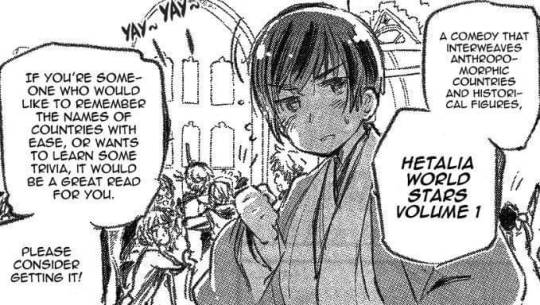
408 notes
·
View notes
Text
After watching Furiosa last night, I was struck by an interesting question with regards to gender roles as they're portrayed in the film's Wasteland. What follows is an attempt to talk about that. Some mild spoilers for the film, but since it's a prequel to Fury Road, it's mostly stuff that's a foregone conclusion.
First I'd like to take a moment to discuss gender, and being transgender. Gender is almost universally agreed on (by those qualified to have input) as a social construct: that is. gender does not exist outside of human thought, and is a set of behaviours and characteristics that we associate and reinforce with each other and ourselves. In most cultures, there are at least two genders: a masculine one and a feminine one. Many others also exist historically and today, as I'm sure you're aware! They are categories we, as humans, have devised and apply to people.
Gender is, essentially, two things. It's what you believe about yourself, and the way you perform in front of others - and the conclusions you make about other people. These are entangled! My idea of femininity as it applies to myself, a transgender woman, also affects the way I view femininity in other people.
It's also necessary I think to briefly talk about sex. To put it neutrally: sex is a cluster of properties that support your anatomy. This can include your genetic karyotype, your dominant sex hormone, your primary and secondary sexual characteristics and many other things. It is not a binary. In humans specifically there are two distinct 'poles' of sex, and a very large spectrum inbetween. No one living corresponds to either pole. They are hypothetical. This is because biology is messy and inconsistent!
Then there's being transgender. In a modern, western context this refers to living a gender role different to the one you were assumed ("assigned") to be at birth based on a doctor's judgement about the appearance of your primary sexual characteristics. Thus you get people born men who live as women, people born women who live as men, and those who live as neither, both, or something else entirely. All these identities are completely valid, because gender is something we create, perform and enforce.
Finally, it needs saying that gender roles vary depending on your culture, and even within cultures will vary over time. Aboriginal peoples recognise 'brotherboys' and 'sistergirls' that overlap with but are not exactly the same as our western notion of trans men and trans women, to name one example.
Okay, got all that?
So, Furiosa is trans.
And this is why I wanted to explain all that up front, because when I say she's trans, I am not saying she's a trans man or a trans woman in the way we would understand that today.
At the start of the film we see a young Furiosa living among her people (her culture) the Vuvalini. They are implied to be matriarchal from statements given in both films. This culture, then, has ideas of gender roles that would be alien to us viewers, and indeed are shown to be different from those elsewhere in the Wasteland. The first non-Vuvalini woman shown in the film is a sex slave. The second is a raider who forces others to see her as equal to men. The Immortan Joe, living in the Citadel, maintains the status of women under his rule as Breeders or Milkers - else they are cast out to the masses below.
Furiosa finds her way into Joe's hands as a child, and because of the way Joe views gender (and sex), is designated a Breeder-to-Be. However, she escapes this fate and disguises herself as a War Boy. She lives in this manner for the next six years, hiding her sex and performing a 'masculine' gender role (which is, fittingly, closer to how she lived as a child among the Vuvalini). A scene during the construction of the Chrome War Rig shows that she specifically goes to urinate alone so that people would not discover her as a 'girl' (behaviour noted as unusual and a little suspicious by one of the Blackthumbs).
She is later revealed to be a woman by Praetor Jack, but for whatever reason this does not bother him (reading between the lines, it's implied that Jack is not a native of the Citadel, and so was probably raised with different ideas of gender than his War Boys). He takes on Furiosa as his apprentice, with Joe's blessing - her status as a woman is now public and known, but she has already performed as a man, so she is perceived as a man. From here on, no one in the film draws attention to her femininity or thinks her lesser for it: she is held as an equal to any of the men of the Wasteland.
This is why I say that she's trans. She is a woman, she does not appear to be dysphoric about being a woman, and among the Vuvalini she would very much be seen as cisgender - but to the people of the larger Wasteland, and the culture of the Citadel specifically, she does not perform the gender roles allowed to women.
I wanted to write about this because it's interesting to me as a way of illustrating gender not just as your internal identity, but as a label applied to you by other people. Nothing in the film implies that Furiosa would ever consider herself a man. She is fiercely proud of her heritage! But she does see herself as different from the Wives, while seeing herself as no different to Praetor Jack.
So when I say "Furiosa is trans", it's actually a subjective statement: Furiosa is trans when she's living in the Citadel, but not when she was a child or after the events of Fury Road when she's killed Immortan Joe and ruling in his stead. The nature of being trans is, pardon the pun, transient, because we can only really be trans when other people perceive us to be! While I wear the label 'trans woman' with some pride, I only do this because society expects me to distinguish myself from those 'born' women. For trans women who pass well enough to live in 'stealth', the label doesn't need to be stated: society sees her as a woman - she is a woman.
It makes me wonder: in another time and place, if I behaved and performed exactly the same way I do now, would I be trans, or would my gender role be considered within the acceptable ones for my perceived sex?
I don't know, but it's fascinating to think about.
#deafmangoes#transgender#transgender philosophy#trans#furiosa#furiosa a mad max saga#furiosa spoilers#spoilers#philosophical rambling
47 notes
·
View notes
Text
IEP Forum on FSC Verdict on Riba - Experts View - Mufti Saad Ali Chippa
IEP Forum on FSC Verdict on Riba – Experts View – Mufti Saad Ali Chippa
IEP Forum on FSC Verdict on Riba – Experts View
Mufti Saad Ali Chippa
Research Scholar and Author
Monthly Zouq o Shouq Magazine
Recently, Federal Shari’ah Court of Pakistan has given its judgement on the Riba case. The verdict reaffirmed the historic judgement on interest first given in 1991. But, the subsequent appeals process reopened the case. Concerns about jurisdiction further delayed…

View On WordPress
#Bank Interest and Riba#Federal Shariat Court#Historic Judgement on Interest#IEP Forum on FSC Verdict on Riba#IEP Forum on Riba#Interest#Islamic Banking#Islamic Finance#Riba#Riba Case in Federal Shariah Court#Saad Ali Chippa#Usury
0 notes
Text
авантура Цанмома у Београду
avantura Canmoma u Beogradu, or, the adventure of canmom in Belgrade
it's another one of these 'travels of canmom' posts! last time we went to Gamescom in Germany. this time I went to Belgrade for a company event.

I can't actually talk that much about this one because the main thing I was doing was cooking up game pitches for what we might work on next (kind of like a game jam but just for concepts), and while that was very interesting and I learned a lot about how to get ideas across in limited time and make judgements about what videogames might sell and how long they'd take to make and such... it is however probably not something I can talk in too much detail about yet, because we might end up making these games, so I can't be like 'the theme was x and we pitched y'.
so instead I will mostly talk about Belgrade! and show some of the photos I took that don't have game developers wandering around in them.

that's Nikola Tesla airport. did you know that Nikola Tesla was from modern-day Serbia (at the time, the Austrian Empire)? I didn't but I do now!
most of the week was spent in this fancy villa...

...which is called the Villa Saga Paradiso. it must once upon a time have been some stinking rich family's holiday home, because it's a super weird building, with such features as a pool table, swimming pool, tennis court, library, and even a weird kinda stage thing on the top floor. definitely full of weirdly shaped rooms and interesting old furniture, it felt kinda like a place a moomin might hole up. so here's some pics of the place.





also the view was kinda insane...


also! here's a pic of a Serbian snail that came out rather nice:

anyway on Saturday we went into the city centre to do some more touristy shit. I went to the two places in Belgrade that presumably everyone goes, namely the Fortress and the Temple. but I also got some shots of the city centre...
(also a tram shot for the trams girls in the audience)
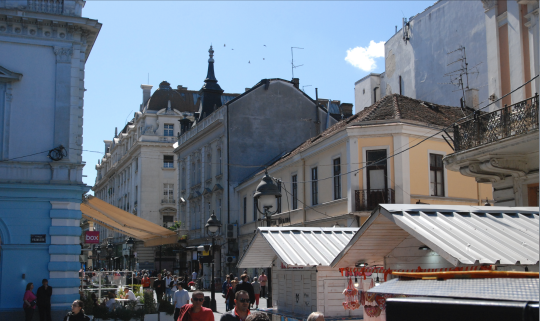
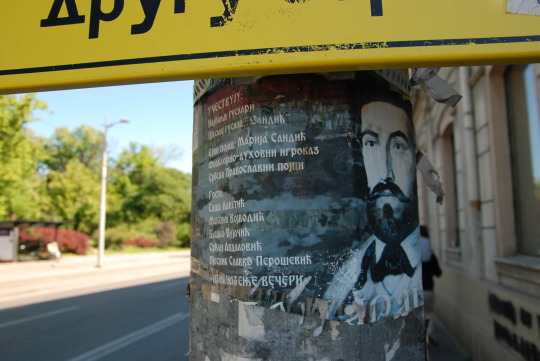






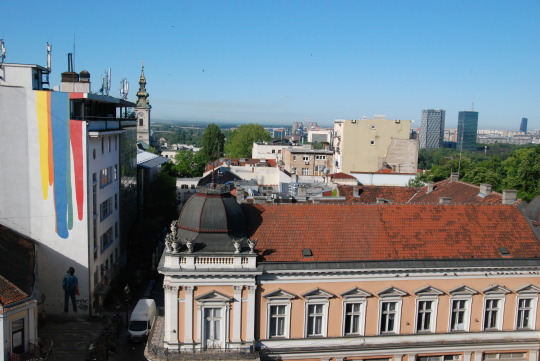
so as you can see, the vibes of central Belgrade are p Southern European sorta architecture, lots of pale stone walls and tiled roofs and the like. but you also have these crazy cool looking tower blocks from the communist period...


...which were unfortunately quite hard to photograph out of a moving car window.
But yeah, we were on our way to the fortress.

Belgrade Fortress has a pretty storied history. At one point it simply was Belgrade; even after that, it's been occupied by variously the Byzantines, Turks and Austrians, who all made various additions and modifications to the fortress, and sometimes accidentally blew it up. Nowadays it's become a kind of park and tourist area, surrounded by the river, and thus some pretty impressive views...


as well as various things that tourists might like to look at, like statues of dinosaurs and tanks, and people dressed Historically.
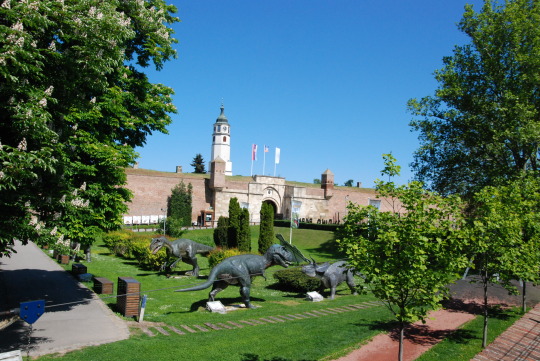
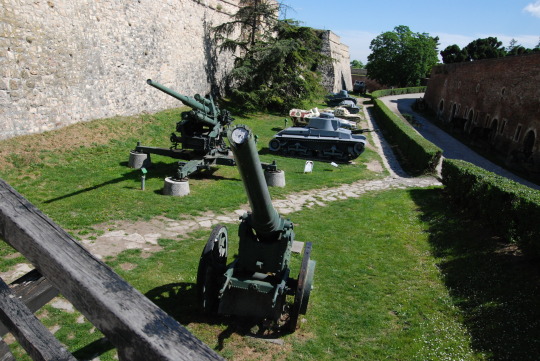
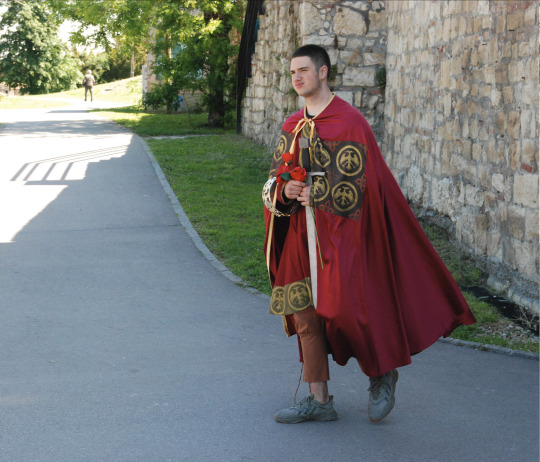
apparently you're only allowed 30 images in a post, so let me make another one for the Temple, which was the craziest building I saw, and the butt statue...
34 notes
·
View notes
Text
Stephen Shoemaker has talked at length about the eschatological nature of early Islam in other books and articles; he makes some very interesting points in The Apocalypse of Empire (which is not just about Islam, although it discusses Islam at length in two chapters), synthesizing some points made by other scholars.
Scholarly trend to view Islam as a movement that was from the beginning pragmatic, not apocalyptic. Other scholars try to portray Muhammad as basically a national unifier/Arab empire-builder, with religion as a tool secondary to this aim. This seems to amount to not taking early Islam as it portrays itself very seriously, and indeed in some cases seems to be almost an apologetic project to try to help make early Islam more relevant to the present day.
Snouck Hurgronje(sp?) argued that early Muslims saw Muhammad's appearance itself as a sign the end of the world was at hand, and that Muhammad would not die before its arrival. He and other scholars after him saw other elements of his message as more or less accessories to his concern with the impending end of the world.
Projects of empire-building and apocalypticism are not necessarily opposed! The rest of this book furnishes examples from Byzantium, Rome, Zoroastrianism. For a contemporary example, we might look at ISIS. It was relatively common in the ancient near east to think the eschaton would be realized through imperial triumph, and that the end of history was imminent. Indeed, Muhammad's religious beliefs probably played a significant role in the dynamism and success of his nascent polity.
Later Islamic tradition like the biographies deemphasized the urgent apocalypticism (again, not unlike Christianity!). But the Quran is rife with warnings of impending judgement and destruction ("the Hour"), and incorporates Christian apocalyptic material like the parable of the rich fool from Luke. Shoemaker furnishes lots of quotes like "The matter of the Hour is as a twinkling of the eye, or nearer," and "The Lord's judgement is about to fall," etc. Astronomical events will predict the Hour's arrival; doubters will soon be proved wrong, etc.
Perspectives from the New Testament help us understand why different passages portray the urgency of the Hour differently; the historical Jesus probably preached an imminent apocalypse, but the Gospels were compiled later, so they can be more ambivalent. Likewise later Muslims, when compiling the Quran, would have to deal with the fact that the "urgent" end of the world hadn't arrived yet; though the strong eschatological perspective persisted (as it did in Christianity, too), there was an effort to try to moderate some of these embarrassing passages.
Some early hadith and other early traditions corroborate the impending eschaton, emphasizing the link between his appearance and the end of the world. "According to another tradition, Muhammad offered his followers a promise (reminiscent of Matt. 16:28, 24:34) that the Hour would arrive before some of his initial followers died. In yet another tradition, Muhammad responds to questions about the Hour’s timing by pointing to the youngest man in the crowd and declaring that 'if this young man lives, the Hour will arrive before he reaches old age.'"
Donner argues the conquests were an effort to establish an interconfessional "community of the Believers" that included Jews and Christians, requiring only belief in God and the last day. According to him, Muhammad and his earliest followers didn't even think of themselves as a separate religion; rather, their earliest community was a loose confederation of Abrahamic monotheists who shared Muhammad's apocalyptic aoutlook, and who were trying to establish a righteous kingdom in preparation for the end. Cf. the Constitution of Medina, which seems to be a very early source. It has a dramatic discontinuity with the ethnic and religious boundaries established in later Islam. Traditionally held to be a brief experiment that ended with Muhammed expelling the Jews from Medina, Donner argues that in fact Muhammad's community remained confessionally diverse for decades, including Jews and Christians into the Umayyad period. Indeed, a lot of their early successes may have been aided by their nonsectarian outlook.
Only under Abd al-Malik(!) does Islam begin to consolidate, and a new Arab ethnic identity crystallizes that distinguishes Muslims from outsiders they ruled.
In variant readings of the Quran we can glimpse a view not unlike that of the early Christians, where the Kingdom of God had its inception in Jesus's works; here, the conquests of the early followers of Muhammad are part of an the initiation of the end times. Muhammad is the "seal of the prophets" in this reading because the world is about to end.
So the picture that emerges from all this is that Muhammad was an apocalyptic preacher and reformer, very much like Jesus, who wasn't aiming to found a new religion necessarily. But he preached that the world was ending, and as part of his preaching on this subject he led the creation and rapid expansion of a new polity meant to unite the community of believers. Only once he died, and the world failed to end, and his followers had to consolidate their gains and transform them into an actual, durable state did a coherent scripture (the Quran) and a coherent religious identity (Islam) emerge, both strongly affected by the new social, cultural, and political contexts his followers found themselves in. The turning point seems to be the reign of Abd al-Malik, around fifty years after the death of Muhammad, when the oral traditions of the original community of believers are approaching their expiry date, and a new generation (and new converts) need a worldview and a political system that is relevant to their present circumstances. This is extremely comparable to the transition from early Jesus-traditions to the Gospels finally being written down in the second century, when the last people who knew Jesus directly, or who knew the Apostles directly, were dying, and the community had to transition to a form that could survive indefinitely, or else be forgotten.
71 notes
·
View notes
Text
The Virtue of Xenia
Xenia means 'hospitality', and is a crucial concept within Hellenic polytheism. To me, it involves being accepting of people who are different, treating people with kindness and respect, and not being a judgemental and hostile person. Historically, xenia represented a good host-guest relationship. In ancient Greece, people were expected to be very hospitable to guests. Another interesting thing is that the gods are quite involved with xenia. I like to use this quote to explain it sometimes: "Be kind to strangers; they might be angels in disguise". Or in this case, gods in disguise.
In many myths, a god will approach someone in the disguise of a human. They do this to test that person's xenia. However, I do not believe that the gods literally do this. It is simply a metaphor to say that the gods are watching our actions and will test us at times.
It is often associated with deities such as Zeus Xenios an Athene Xenia (epithets of Zeus and Athene respectively).
Like many other abstract concepts, xenia also has its own embodying daimon.
Please note that this is my own interpretation of xenia and may not resonate with everyone. Some people may view xenia a bit differently, but it is generally seen as a very important concept in Helpol.
#hellenic polytheism#hellenic paganism#hellenic pagan#hellenic polytheist#helpol#helpolblr#hellenism#polytheism#polytheist#paganism#pagan#xenia
58 notes
·
View notes
Text
with mousey and bad together on the server, there's been a lot of talking about her as satan (it's been clarified by mousey that all she remembers is that she's a demon from hell) and her as bad's boss, and i wanted to do a bit of a deep dive on bad's demon lore through both a "pop culture" view and a more traditional biblical view.
in pop culture we've had a lot of mixing up of demon lore in general, with the prevalent idea that demons are creations of hell, and not all of them necessarily fallen angels or previously heavenly beings — it's a perfectly valid analysis, but i'm firmly convinced that bad's character is not just any demon, but instead very much a powerful demon that was once an angel.
let's start with what we do know of q!bad's personal history and slot things into their proper place. we know he's around 11600 years old (making his "date of birth" somewhere around 9577 BC. we also know he arrived in this world (which in this case we have to assume is whichever dimension qsmp is held in) in 9600 BC which means he lived the majority of his life away from his home — he was barely 23 when he "moved".
we also know that he didn't come to this dimension willingly, that he was summoned and in that summoning he caused serious destruction — it's been made pretty apparent that the man sunk atlantis, and frankly there's still a question as to whether he did it on accident or not, or the reason why he keeps it hidden. according to bonnie the horse, he sent them a lot of "salty souls" once, and bonnie has also dubbed bad "death of the sea". it doesn't matter whether bad is hiding because what he did made him famous, or because he feels terrible — what matters here is that one singular demon was able to cause the destruction and sinking of a whole civilization singlehandedly. he was also able to do it at a pretty young age.
we also know that bad has eaten souls before (as well as anything he can get in his mouth, apparently), that he's got a way to avoid being summoned (as he told dapper he'd let him know later) and that for better or for worse, he's immortal. so, it's safe to say that bad is an extremely powerful being that cannot be killed by any means, and who has enough control over himself to not only hide his true nature but also contain himself to the highest degree.
speaking of death, bad's relationship with it is very interesting on a few levels. we know he's employed as a grim reaper (and that being a grim reaper is completely removed from his origins, it's just a job) and that to one degree or another, he's acknowledged mumza as the goddess of death as being canonical to him as well (yesterday tallulah spoke about death as a beautiful woman, and bad confirmed to chat she meant mumza).
but what is a grim reaper?
traditionally, grim reapers (or those who served their role) were nothing more than physical manifestations of death with the purpose of easing humans from one plane into the next. they're friendly and kind, and historically for the longest time (up until the middle ages and the plague) they were positive figures, reminiscent at many times of angels.
now, onto angels. angels biblically are far from the cherubic vision we see most often — they're whatever they're needed for. they can be kind-hearted messengers, but they're also warriors and if need be, and they can be incredibly dangerous to humans. why did some fall? simple enough, they sinned. there are passages in the bible regarding the fall of angels and they're described as losing the war in heaven, being cast down with "satan" (while satan and lucifer are not entirely interchangeable and they're often considered two different people, biblically today they're presumed to be the same so let's just roll with it for now) into hell. other passages speak of angels who sinned against god and who await judgement in hell.
but what does any of this have to do with badboyhalo, you ask? well… more than it seems at first if you put it all together. on a basic level, bad wouldn't be considered your average demon — yes, he's full of mischief, has an odd moral compass, and can be incredibly violent, but he's also very kind, and very gentle, and very very loving. there are contradictions in his personality that could be discounted as meta… but the evidence continues to pile up. bad is full of angel iconography, from the actual halo in his name and in his preferred design, but his new build in his home is really beating us over the head with it — he build two statues that can only be described as holy warriors, dark and demon-y but with a golden halo and beautiful white wings.
then, there's "the chair". which is not a chair, it's very much a throne, but for whatever reason bad seems vehemently opposed to admitting that it is, in fact, a throne — it's huge, and full of dark and red blocks, fire… and behind it? huge angel wings. now, one could argue that they're bones, but there are details in the blocks that very clearly allude to feathers — the idea of white feathery wings is a direct parallel to angels, and i think it's very intentional.
who, then, is badboyhalo? i'd put my money on his personal lore being connected to the demonology idea of "the princes of hell" — angels who fell from the grace of god, and took up their kingdoms in hell. i'm fully convinced that bad is a prince of hell. now, which one? that's trickier, and not something we know enough to real pinpoint, especially when you consider that the identity of the princes of hell is pretty fluid — there's a lot of different texts who name different demons, so i'm choosing to simplify it until we get more information.
tl;dr - badboyhalo is not just any ol' demon, but a fallen angel — one of the "princes of hell".
a special thanks to @comradeboyhalo because this post was very handy!
#qsmp#q!badboyhalo#qsmp theory#qsmp analysis#qsmp badboyhalo#long post#this is..... too long and convoluted but here we go
144 notes
·
View notes
Note
My wife's double life is not bad but I'm 9 episodes in and the FL is a mess she's so unreasonable and immature and the way she keeps acting like it's the ML that's somehow doing something wrong? What is it with Chinese dramas and female characters like this it's not cute and it's not feminist it's just shit writing is this like one of the CCP mandates or something because it's crazy how common it is?
FL of My Wife's Double Life is starting to grind my gears so I sympathize. But one thing I think we need to remember is we're self-selecting here when we watch this style of dramas: we're watching specifically female-centered, historical romance genre targeted to younger female audience. There are many chinese tv shows that don't have any romance at all and many that certainly don't have this type of character in them. If someone went to american tv and only watched the Hallmark Channel and Lifetime translated to their language, their opinion of American tv would be skewed.
Many dramas are more mature and targeted at broad adult audiences. But there's a certain immaturity of characterization that I see in media targeted at young adults. Emotions can feel very heightened when you're younger. And I think perhaps some younger people wish they could behave this way and "get away with it". Just give into all your feelings.. be loud & disruptive & illogically demanding, yet experience no consequence: your love interest and your family members cater to you instead of being repulsed by the behavior. It's a kind of wish fulfillment.
There are many english language rom-coms that feature seemingly irrational women who make snap judgments and stubbornly stick to them, then make a loud fuss about them; often unfairly judgemental, nit-picky, and self-involved. (If it's a bit less common now in english media, that's probably as a backlash reaction of this tv writing generation being part of an audience that was getting frustrated by it.)
In most fiction categories, 10% will be great and if you're lucky then 40% will be good. The rest... isn't. That's for all regions and languages.
Just off the top of my head, in the last 3 months I just watched cdramas Legend of Shen Li, Blossoms in Adversity, Parallel World, In Blossom, and now The Double with a mature female lead who isn't this characterization type. (In Blossom has a FL suspicious of ML but her suspicions are rational imo). Joy of Life and Heroes aren't romances but they didn't have female characters of this style either.
So we shouldn't say, why are chinese dramas like this? The question is, why is a certain sub-genre of romances written this way, and who is the target audience for it, and why does it appeal to them?
#anon ask#idk what country u are from anon but#as a person residing in the country that brought the world#secret life of an american teenager i feel i have no legs to stand on#in critiquing mature realism in romantic dramas 😂😭
20 notes
·
View notes
Note
Curious what u think of the judgment side quests in DAI? Somere fine but for most the options while judging are 'death sentence' 'imprisonment' or 'indentured servitude' which are all pretty bad?
i mean i think it’s up to you whether you consider dealing out premeditated punishments worse or better than killing dozens of randoms at a time out in the exalted plains or whatever. neither of those things are great but remember that it’s only the people in charge who ever get the privilege of trial
sorry to be a nerd here but i’m way more interested in the political implications which are fucking insane. so one of the absolute most prime functions of a quasi-medieval king is adjudication. one of the reasons the aristocracy even lets there be a king is because someone has to make those decisions to end disputes—usually what land belongs to who, because that’s what it always boils down to—so that people’s rights are respected and we’re not just in all out warfare all the time. higher authority is useful. and sometimes that search for higher authority that can actually enforce the result needs to go beyond the borders of your kingdom. the church fulfils this role a lot, especially between kings, but you also know a king or emperor is powerful and respected as hell when they’re getting called on to adjudicate disputes even outside of their own borders. this half-remembered over simplified summary of historical information that is no doubt making someone shake their head in despair all goes to say that the fact that the inquisition is overseeing justice on orlesian and fereldan territory is insane. i could believe it for orlais, which is obviously in civil war and full of desperate nobles whose land rights and grievances are not getting attended to in the slightest, if it weren’t for the inquisition inexplicably getting to judge and potentially humiliate a grand duchess. the EMPRESS’ COUSIN OR THE EMPEROR’S SISTER. and as for ferelden, a country that holds its freedom as its highest ideal, and very much has its own monarch?? what the fuck is going on. the inquisition isn’t even chantry-backed it’s a popular army of fanatics led by a handful of rebels who were close to a dead divine. on what fucking authority?? the fake herald of andraste’s?? arl teagan kill these fools. i would be surprised if the punishments of anyone who isn’t dead outlive the inquisition btw even if just for orlais and ferelden to assert their authority again
i really enjoy the judgements on a player level i think they’re fun and i like when what the inquisitor is doing actually makes sense for a leader of this scale of organisation instead of wandering around the forest personally mining the inquisition’s supply of iron or whatever tf
134 notes
·
View notes